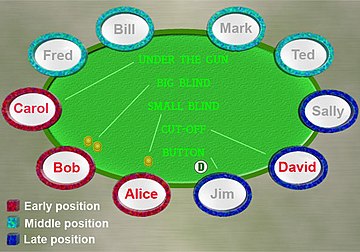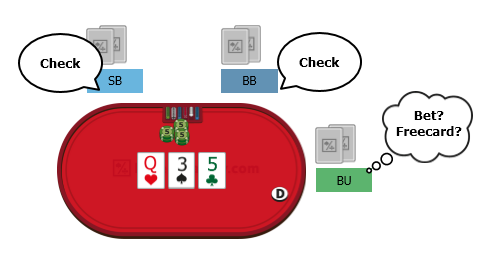Best Position In Poker
A good poker player knows that position is a crucial factor in the game and plays a vital part in the success of a player.
The term “playing in position” means that a player who is in this situation is the last one to make their move after they have seen what everybody else has done.


But why is it so important to play in Position?
Because position is so important, you must adjust which poker hands you want to play (and/or open-raise with) from the various poker positions to achieve a winning strategy. The further you are away from the button (to the right of it), the tighter your starting hand range should be to compensate for your (likely) lack of position on the.
- To display the effects of position in poker more clearly, we have eliminated the loss-making positions small blind, big blind and UTG from the previous chart and indexed the winnings to the best position, the dealer button. As you can see, the two late positions are by far more profitable than the other seats at the poker.
- Of course, the late position in poker is considered the best. On the button or cut-off you can play a much wider range of hands than in the middle or early positions.
Why is it Best to Play in Position?
If you’re playing in position, you have the maximum amount of information available to any player. You have the edge because you get an idea of what is happening with your fellow players before it is your turn to play, and you have to decide what you are going to do with your hand.
Someone who is not playing in position is groping in the dark, trying to guess the value of his opponents’ hands without getting any information from them first.

This article is not designed to teach you the various different positions in poker, if you want a refresher then take a look at the Poker Position lesson in the How to Win at Poker Course in the University.
Advantage: Playing In Position
Playing in Position is the phrase used when you are playing in Late Position. This means that you are on the dealer button, or the few seats to the right of it.
Because the play always starts from the seat to the left of the dealer button, this means that it goes around the whole table before it reaches you, and all your opponents have had to reveal some information about their hand before you have to make any decisions.
Poker can seems delightfully easy when you’re playing in position. When you’re joining a table, spend some time observing the table and try your best to get the seat to the left of the weak players at the table. This way, you’ll get the most possible time being in position and can wield that positional power against the weaker players who don’t have the know how to recognize what you are doing or defend against it.
Because of the power and usefulness that playing in position carries, it is sometimes referred to as the “Jesus Seat”. You can walk on water or perform any miracle when you’re playing in position, with your enviable control over other players, and thus the game. Your rivals are forced into a defensive position and have to play what is called “scared poker”, ever apprehensive about the outcome of the hand.
Disadvantage: Playing Out of Position
Anybody playing in Middle Position or Early Position (the blinds and first few seats to their left) is said to be playing “Out of Position”.
It’s no coincidence that a person whose turn comes straight after the cards have finished being dealt is said to be playing “under the gun”. This expression, however alarmingly is it, describes the situation well as it is the position that is most perilous and often proves to be very expensive for players who play hands regularly in this position.
Under the gun, you are the first to act before the flop and among the first to act after the flop, so you lose the opportunity to gather information from your opponents actions before you have to act – this opportunity is in the hands of the person who is playing in position. So you will usually find the players in position controlling and defining the way a hand is played.
If you are in an early position, you would be well advised to play very tight. Since you are not in position, you are at a disadvantage, so counteract that by reducing the time you spend playing out of position. This makes later decisions simpler to make.
There is a simple strategy to apply when considering playing out of position. Only play really good hands. You should have cards comprising aces, kings and pairs. Secondly, if you have pocket aces, pocket kings or pocket queens or ace king, raise at a tight table, and limp in at a loose table.
You can try placing “feeler” bets in an early position to check out your opponent’s reaction to it, and gain some information on them. But in general out of position make sure that your game is extremely tight and play your hands carefully to make the best of playing out of position.
Best Seat Position In Poker
Again this Bitesize Strategy article is not designed to go into depth on how to play in certain positions and this is given the time it deserves and covered in much more detail in the How to Win at Poker Course in the University.

Position: the road to a more healthy Bankroll
The message from this article is simple. There are huge advantages to playing whilst in position, so you have the choice, do you want to play more hands where you have an advantage, or stick to playing at a disadvantage.
Best Position To Raise In Poker
I know which one I choose, and my poker bankroll thanks me for it!